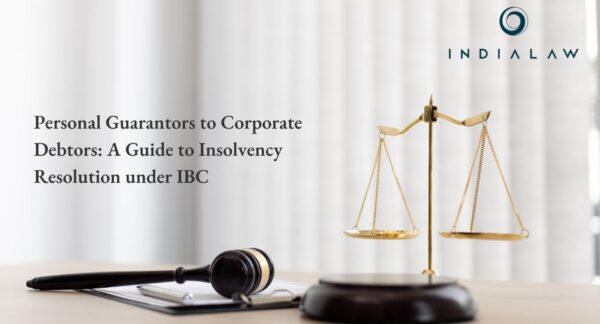MORATORIUM WOULD NOT APPLY TO PERSONAL GUARANTOR OF CORPORATE DEBTOR


The Supreme Court of India delivered two judgments under the Insolvency and Bankruptcy Code 2016 (“Code”) recently. While one judgment dealt with the applicability of moratorium under the Code over proceedings against personal guarantor of corporate debtor, the other one dealt with the over riding effect of the Code on other enactments. Synopsis of both the judgments are below.
No Moratorium on Personal Guarantor
The Supreme Court Bench headed Justice R F Nariman in State Bank of India vs. V Ramakrishan & anohter[1] settled a controversial issue regarding the applicability of moratorium on proceedings against personal guarantor of corporate debtor under the Code.
In the present case, corporate debtor initiated corporate insolvency resolution process (“CIRP”) by itself, during the pendency of SARFAESI proceeding. Section 14 of the Code provides for a moratorium on all other proceedings against corporate debtor upon initiation of CIRP. In this proceeding, the personal guarantor of the corporate debtor, its managing director, contended that the moratorium under Section 14 of the Code is applicable to personal guarantor as well; hence no proceeding can be continued against him or his property. NCLT upheld the contention on the ground that “since under Section 31 of the Code, a Resolution Plan made thereunder would bind the personal guarantor as well, and since, after the creditor is proceeded against, the guarantor stands in the shoes of the creditor, Section 14 would apply in favour of the personal guarantor as well.” NCLAT also upheld this view.
In the appeal to the Supreme Court, the appellant contented that that the corporate debtor and personal guarantor are separate entities and that a corporate debtor undergoing insolvency proceedings under the Code would not mean that a personal guarantor is also undergoing the same process.
It its judgment, the Supreme Court after analyzing Section 14 of the code categorically stated that “[A] plain reading of the said Section, therefore, leads to the conclusion that the moratorium referred to in Section 14 can have no manner of application to personal guarantors of a corporate debtor.”
Section 60 of Code, which places jurisdiction on NCLT on matters relating to insolvency of corporate debtor and personal guarantor, was heavily relied on by the respondent in favor of their arguments that insolvency resolution process on the corporate debtor will be extended to personal guarantor as well. However, this view was rejected by the Supreme Court on the ground that Section 60 only clears jurisdictional issue and since Part III of the Code, which deals with insolvency resolution of individuals, is not yet notified, the provisions of the Code is not yet applicable against individual personal guarantors. The Court observed that “the scheme of Section 60(2) and (3) is thus clear – the moment there is a proceeding against the corporate debtor pending under the 2016 Code, any bankruptcy proceeding against the individual personal guarantor will, if already initiated before the proceeding against the corporate debtor, be transferred to the National Company Law Tribunal or, if initiated after such proceedings had been commenced against the corporate debtor, be filed only in the National Company Law Tribunal. However, the Tribunal is to decide such proceedings only in accordance with the Presidency-Towns Insolvency Act, 1909 or the Provincial Insolvency Act, 1920, as the case may be.” In other words, since Part III of the Code is not yet notified, NCLT should handle proceeding against personal guarantor under the exiting laws of insolvency and not under the provisionsß of the Code.
Section 31 of the Code was also strongly relied upon by the Respondents. This Section states that once a Resolution Plan, as approved by the Committee of Creditors, takes effect, it shall be binding on the corporate debtor as well as the guarantor. The Court observed that Section 30, in fact, makes it clear that the guarantor cannot escape payment as the Resolution Plan, which has been approved, may well include provisions as to payments to be made by such guarantor.
It is pertinent to note that the recent amendments to the Code state that the moratorium under Section 14 (1) shall not apply to a surety in a contract of guarantee for corporate debtor. The bench observed that the object of the amendment was to clarify the intent and such clarificatory amendment is retrospective in effect.
Overriding Effect of the Code
The same bench of the Supreme Court in another judgment PR Commissioner of Income Tax-6, New Delhi v. Monnet Ispat & Energy Limited[2] held “[G]iven Section 238 of the Insolvency and Bankruptcy Code, 2016, it is obvious that the Code will override anything inconsistent contained in any other enactment, including the Income-Tax Act.”
The Bench upheld the decision of the Delhi High Court, which held that the moratorium period under Section 14 of the Code would also apply to the order of the Income Tax Appellate Tribunal in respect of the tax liability of the assessee.
The Bench also referred to the decision in Dena Bank v. Bhikhabhai Prabhudas Parekh and Co. wherein it was held that income-tax dues, being in the nature of Crown debts, do not take precedence even over secured creditors, who are private persons.
[1]. Civil Appeal No. 3595 of 2018
[2] Special Leave to Appeal (C) No(s). 6483/2018



